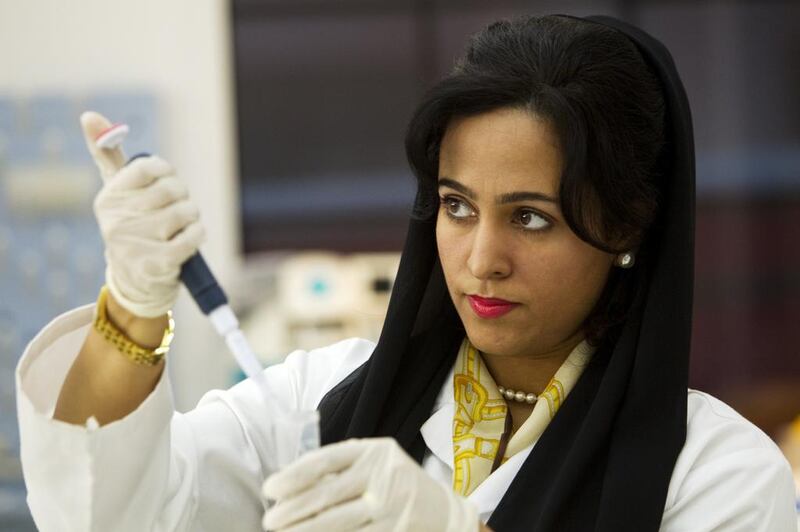ABU DHABI // An Emirati who has devoted her life to battling genetic disorders prevalent in the UAE has been listed among the 20 Most Influential Women in Science in the Islamic world.
Dr Maryam Matar, 38, founder of the UAE Genetic Diseases Association, has joined the list of pioneers, shapers and emerging champions of science with her humanitarian work and achievements.
“I was so proud and so honoured,” said Dr Matar, whose work at the helm of the association is best known for its awareness campaign on the blood disease thalassaemia, of which one in 12 Emiratis are estimated to be carriers.
Dr Matar said the achievement would not have been possible without the work of her team and the trust and support of the President, Sheikh Khalifa, and Sheikh Mohammed bin Rashid, Vice President and Ruler of Dubai.
“It is very important to show that their support in investing in women in science and helping us and financing us to train abroad gives us the confidence and the good knowledge that will benefit the whole community,” she said.
Dr Matar has worked to reduce the prevalence of genetic disorders in the nation since 2001. She founded GDA in 2006 and was responsible for initiatives including UAE Free of Thalassaemia 2012.
“It is a passion of mine,” she said. “Genetic disorders are of high prevalence in our community.”
Dr Matar said studies showed that Emirati women were having fewer children as they juggled career and home.
“Therefore it is important that if women have just two children, those are born with good genes that are better quality than their parents,” she said. The 20 Most Influential Women in Science in the Islamic World is presented by Muslim-Science.Com, an online journal dedicated to the revival of scientific innovation and entrepreneurial culture in the Islamic world.
“These are truly the unsung and little-known heroines of the Islamic world,” its website says.
The work of the GDA, a non-profit organisation, has helped to spread awareness of other genetic diseases prevalent in the UAE, including sickle-cell anaemia and G6PD deficiency, a genetic blood disorder that occurs across the Arab world.
The organisation’s activities include promoting health education, screening for genetic disorders, pre-marital screening and genetic counselling.
Dr Matar said she realised early in her life that she could make changes to help improve people’s lives.
“I live what I do. I am lost if I don’t help others,” she said. “The only way to help me get to my destiny is the humanitarian way.”
A highlight of her inclusion on the list, she said, was receiving a call from Sheikh Nahyan bin Mubarak, Minister of Culture, Youth and Community Development and honorary chairman of the GDA, to personally congratulate her.
“This shows what our sheikhs are like,” said Dr Matar, who was also named 83rd in the 100 Most Powerful Arab Women 2012.
“They learn and follow what we are doing.”
She was also responsible for launching the UAE Down Syndrome Association in 2004 and was the first Emirati woman to become a director general in the Dubai Government, at the Community Development Authority.
She was the first Emirati woman to be appointed under secretary of the Ministry of Health, where she led and supervised initiatives to improve primary health care in the Northern Emirates.
Dr Matar is also the deputy chairwoman of Dubai Cares.
And she has no intention of slowing down.
“I am aiming for the Nobel Prize in 2031,” said Dr Matar, of Dubai.
jbell@thenational.ae





